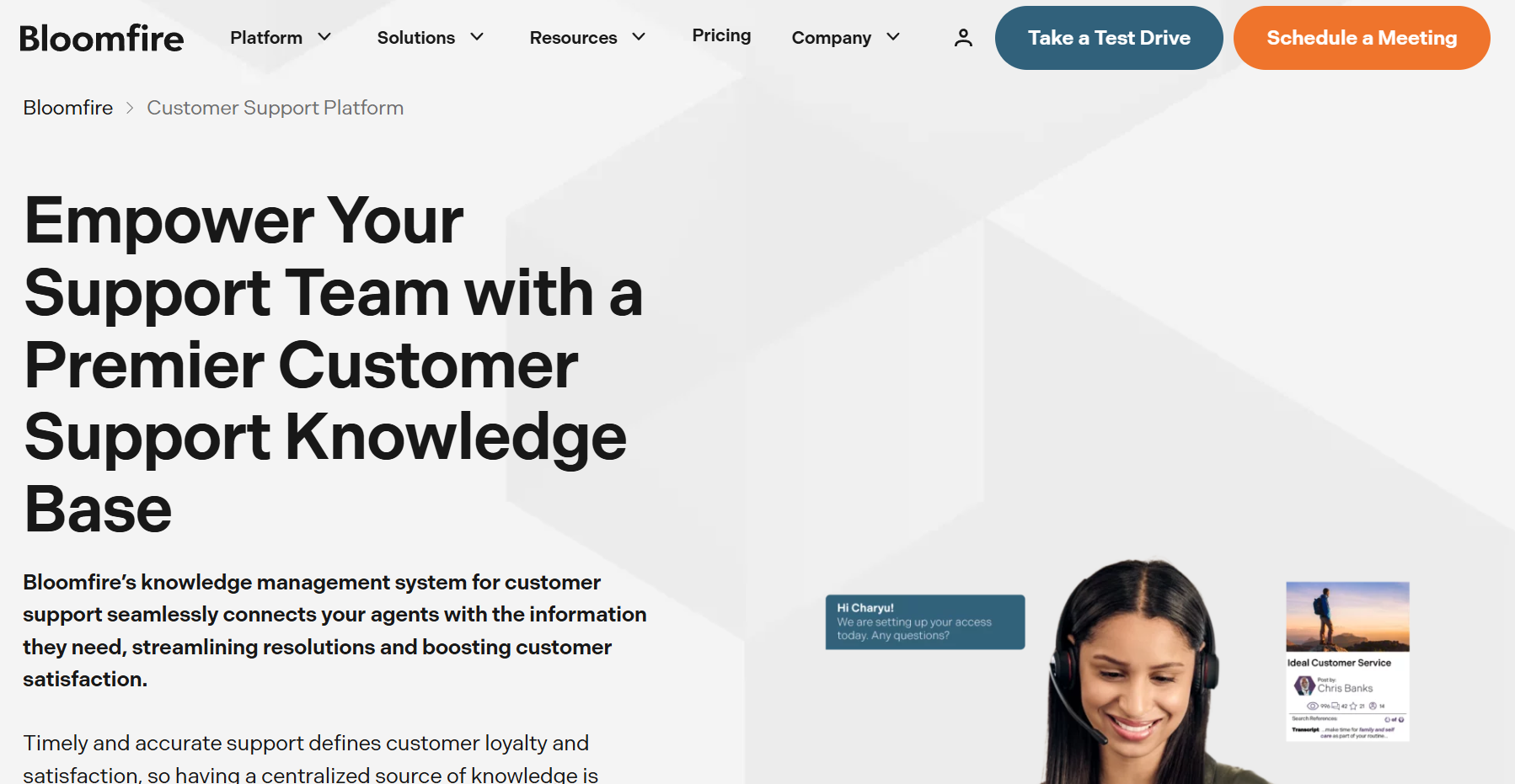How to Empower Customer Service Agents to Deliver Better Experiences

You’ve undoubtedly heard the adage, “Give a man a fish, and he will eat for a day, but teach a man how to fish, and you will feed him for a lifetime.”
You can apply the same wisdom to customer service. When customer service (CS) agents feel like they don’t have the knowledge or authority to solve problems independently, they frequently consult a manager or team leader to ensure they provide the correct resolution. That leads to frustration all around—including for customers who have to wait for their issues to be addressed.
However, equipping your reps with the right tools, knowledge, and policies can empower customer service agents to address more customer issues independently. This benefits everyone in the organization and greatly improves customer experience. To reinforce empowerment in customer service, consider the following tips.
1. Ensure Optimum Onboarding and Training
Employee empowerment begins on an agent’s first day. Make sure that your onboarding process covers necessary orientation and training, not just regarding company policies and procedures but also job protocols and tool usage. Allocate time to discuss best practices for addressing customer issues.
To make the onboarding process effective, consider the pace of the training. A jam-packed week-long training can be overwhelming and lead to knowledge loss. Design a training schedule that appeals to different learning styles. For example, incorporate self-paced modules and accessible training materials so employees learn at a pace that works for them.
Power move: Keep your onboarding and training documents in a knowledge management system designed for customer support. This platform allows them to access all resources that improve their resolution time and quality.
2. Establish Clear Goals and KPIs
Setting transparent expectations with your customer service reps allows them to understand their purpose and direction better. When your agents are oriented on their responsibilities, they develop a sense of ownership at work and a bigger picture of how their role impacts the overarching company goals. Plus, in removing ambiguity in their functions, you set them up for success with regard to their performance and professional development.
Along with clear goals, it’s also essential to spell out your CS agents’ key performance indicators (KPIs), which may include:
- customer satisfaction call (CSAT)
- average handle time (AVT
- net promoter score (NPT)
- first call resolution (FCS) rate
Hitting their KPIs (or, better yet, exceeding them) can motivate your CS team, empowering them to strive for excellence.
3. Provide the Right Tools
Your CS team can perform their job not just through sufficient training but with the use of the most appropriate tools that drive efficiency and productivity. Thus, it is critical to meticulously identify and invest in technology that can help produce empowered customer service agents in all aspects of their roles.
For example, internal chat systems are necessary for employees to reach out to coworkers in real-time. On the other hand, your CS teams can use customer relationship management (CRM) software to house valuable notes about customers’ previous interactions with customer support and any past issues and resolutions.
Another valuable customer support tool is knowledge management software that allows employees to find the information they need to assist customers easily. These pieces of information can be in the form of canned responses, call scripts, email templates, etc.

Power Move: Consider self-service tools for customers, like a customer-facing knowledge base. These tools allow customers to find answers on their own—especially to common, straightforward questions—which can deflect calls from your customer service team and allow your agents to focus on the issues that truly require their expertise.
4. Make Resources Easy to Find
When agents are on the phone with customers, they need to be able to think on their feet and act quickly. However, searching through emails, a company intranet, and old files can be challenging to find the information they need.
You can empower your agents to become more self-sufficient by providing them with a centralized, searchable customer service knowledge management platform.
Housing all company policies, procedures, best practices, FAQs (frequently asked questions), customer service playbooks, and more in one central location makes searching for resources faster and more efficient. Your CS reps can pull out and use any information immediately, allowing them to foster a positive customer experience via customer service.
5. Keep Resources Up to Date
It’s important that resources are located quickly, but it’s equally critical that they are kept up to date. Customer service agents can’t effectively and confidently resolve customer requests if they’re not sure whether they’re referencing the current version of a policy, process document, or other relevant information.
Updating knowledge can be time-consuming. Thus, it’s helpful to select a knowledge management platform with tools to help you automatically archive outdated or irrelevant content. With a knowledge management platform containing only trusted, up-to-date content, your employees will be better equipped to find accurate information and use it to resolve customer issues.
6. Encourage Autonomy
Autonomy is a critical component of motivation and a key driver of performance. In other words, autonomous employees will do better work. That, in turn, creates a better customer experience among brands and benefits the company as a whole. Plus, when customer service agents are more self-sufficient, leaders have the flexibility to focus on core business-building responsibilities.
Independent customer service agents are often more engaged and responsible, allowing them to reach faster resolutions, improve problem-solving skills, and deliver top-notch customer service experience. However, cultivating a culture of autonomy must be organization-wide.
Empowering your customer service team to be self-sufficient starts at the top of your company. Leaders must demonstrate that they trust employees with a reasonable amount of power and autonomy to solve issues on their own. Your reps must perceive psychological safety to develop their ideas or take the initiative to solve a problem without fear or hesitation.
Power Move: Avoid micromanagement at all costs. Instead, encourage your customer service agents to take ownership of their role, share knowledge, such as procedures or practices that work best for them, and trust their judgment within boundaries.
7. Set Up a Sustainable Rewards System
Recognizing and rewarding your CS team for outstanding performance, achievements, or specific behaviors empower customer service agents as these acts show that the company values their dedication and hard work. To ensure this positive reinforcement system is stitched into the team’s culture, recognition and incentives must become a consistent framework and be documented in your KM platform.
Employee reward programs should go beyond occasional bonuses and must be designed to boost morale that drives your reps to deliver better customer experiences and pursue continuous learning. You can even deploy gamification to drive healthy competition.
Offer reward variety aside from monetary options (e.g., performance-based bonuses, gift cards, salary increases). Some examples of these non-monetary rewards include public acknowledgment, newsletter feature stories, conference attendance, extra vacation days, etc.
Develop clear criteria on who qualifies for specific rewards. As to recognition, you don’t have to be rigid with the frequency and count, significantly if an agent can benefit from a well-deserved shoutout.
8. Maintain Open Lines of Communication
A key factor in customer service empowerment among teams is fostering a culture of openness and support, which can be achieved through establishing open communication. Managers should provide multiple channels of communication where reps can get information quickly when resolving issues.
Aside from internal chat systems, teams should leverage their customer service knowledge base. This can reduce escalations and promote confidence in decision-making.
In addition, managers and leaders should set an avenue for agents to voice their concerns, ideas, pain points, and insights valuable to their roles. Supervisors should also provide positive and constructive feedback to help them elevate their customer service skills and performance.
9. Provide Coaching and Encourage Mentoring
Solid mentorship among your customer service agents positively influences employee empowerment and retention, which is why 98% of US Fortune 500 companies have robust mentorship programs.
Customer agents are bound to solve recurring customer service concerns independently with the help of your designated tools and resources. However, in the interest of improving career development initiatives and tackling complex issues, ongoing coaching, and mentoring from more experienced representatives allow your agents to improve their skills.
Veteran employees can help newer agents understand their roles better. They can show the ropes on how to navigate complicated customer challenges and think of possible solutions through knowledge transference, whether via in-person or virtual coaching.
Power Move: Bolster your customer service team’s coaching and mentoring initiatives by encouraging senior employees to transfer their knowledge and expertise to your KM platform. Ask them to document answers to common questions, best practices, and any tips they have for addressing unique situations.
Real-World Examples of Empowerment in Customer Service
When you have a clear plan to fortify your CS team through empowerment initiatives, the benefits become apparent through increased customer satisfaction, engagement, and overall experience. The following companies were a testament to these positive consequences. Check out their core strategies for inspiration.
1. Zappos: Prioritizing personal connections
Zappos, an online retailer initially known for its shoes but has then evolved to add clothing and accessory products, prides itself on imposing a customer-centric approach in its CS team that paved the way for agent empowerment. The company prioritizes employee happiness through initiatives like on-site life coaches, nap rooms, and a culture of celebrating individuality.
New hires undergo four weeks of training, including a week focused on company culture and customer loyalty. Agents are further empowered to spend as much time as needed with customers to build rapport and find the right solutions.
2. Marriott International: Maximizing technology and training
As the largest international hotel chain in the world, Marriott International equips its associates with the technology and training necessary to personalize guest experiences and resolve issues efficiently. Comprehensive training programs that focus on problem-solving, guest communication, and cultural awareness are provided to empower customer service streamlining.
Associates use mobile devices to access guest preferences, service requests, and real-time information, allowing them to provide proactive and personalized service. Plus, guests can use the Marriott app to make requests directly to associates, who are encouraged to fulfill them promptly.
3. USAA: Strengthening agent decision-making capacity
The United Services Automobile Association (USAA) is dedicated to providing financial services to military members and their families. In 2024, USAA was ranked number one in customer satisfaction with insurance in the J.D. Power Individual Annuity Study.
USAA managed to maintain high satisfaction levels, likely due to factors like strong customer loyalty, a reputation for excellent service, and a focus on meeting the specific needs of its military customer base. The company provides comprehensive training programs. Agents develop expertise in USAA’s products and services and in the specific financial challenges and life events that military families face.
Equipping the CS teams with the skills and knowledge is a universal goal for companies. Those who find success in this aspect of the business underscore the relevance of connection and leveraging the right tools to enable customer support excellence.
Customer Service Empowerment Goes a Long Way
Empowering customer service agents to be more self-sufficient benefits everyone: employees feel more ownership and satisfaction, customers receive quicker resolutions, and team leads can focus on other tasks. Ultimately, creating an autonomous team can deliver the best possible customer experience and enhance your company’s competitive advantage.
This post was updated and expanded most recently in November 2024 to reflect new information and best practices.
Strengthen Your CS Team
Bring the best out of your agents with a reliable knowledge management system.
Learn More

A SharePoint Alternative That Unlocks Enterprise Intelligence

What Is Enterprise AI Search? (And Why Your Business Needs It)

The Value in Knowledge Sharing Sessions

Start working smarter with Bloomfire
See how Bloomfire helps companies find information, create insights, and maximize value of their most important knowledge.

Take a self guided Tour
See Bloomfire in action across several potential configurations. Imagine the potential of your team when they stop searching and start finding critical knowledge.